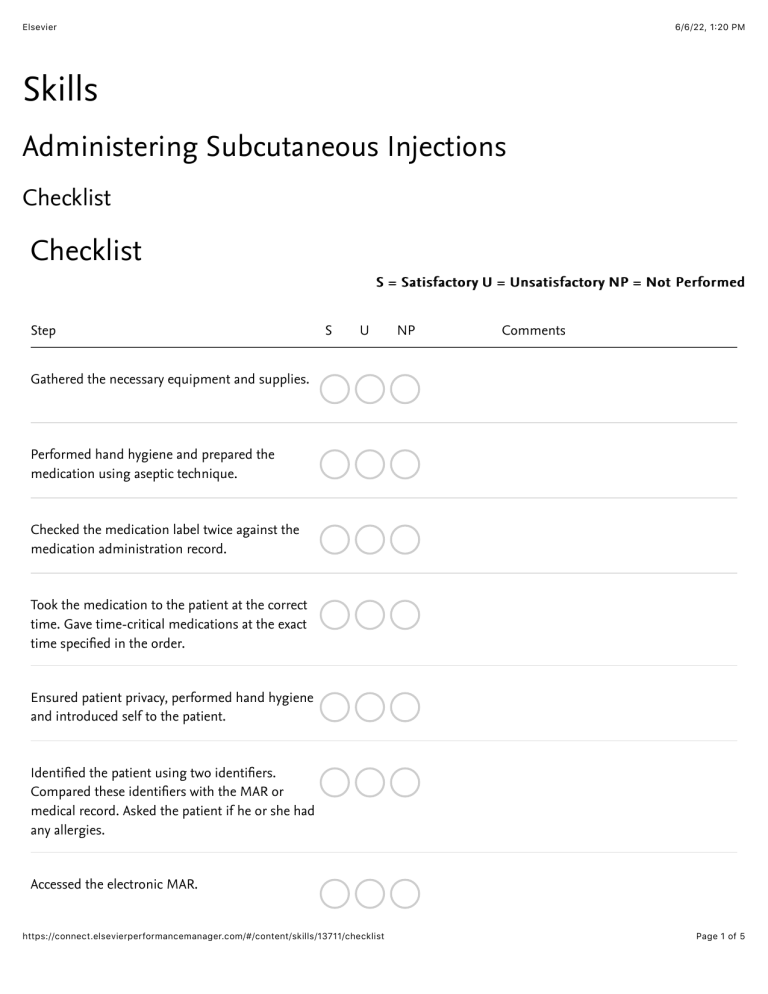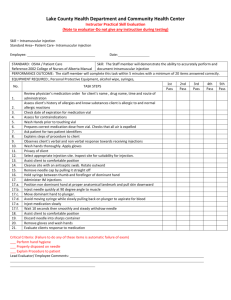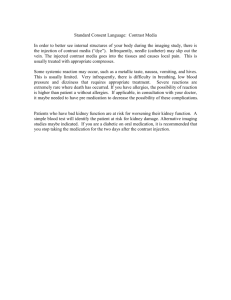
Elsevier 6/6/22, 1'20 PM Skills Administering Subcutaneous Injections Checklist Checklist S = Satisfactory U = Unsatisfactory NP = Not Performed Step S U NP Comments Gathered the necessary equipment and supplies. Performed hand hygiene and prepared the medication using aseptic technique. Checked the medication label twice against the medication administration record. Took the medication to the patient at the correct time. Gave time-critical medications at the exact time specified in the order. Ensured patient privacy, performed hand hygiene and introduced self to the patient. Identified the patient using two identifiers. Compared these identifiers with the MAR or medical record. Asked the patient if he or she had any allergies. Accessed the electronic MAR. https://connect.elsevierperformancemanager.com/#/content/skills/13711/checklist Page 1 of 5 Elsevier 6/6/22, 1'20 PM At the patient’s bedside, again compared the MAR or computer printout with the names of the medications on the medication labels and with the patient’s name. Used a bar code system or compared the MAR to the patient’s armband to ensure patient specific medication administration. Explained the procedure to the patient and ensured that he or she agreed to treatment. Discussed the purpose of each medication with the patient, including its action and possible adverse effects. Allowed the patient to ask questions. Found out where the last injection was given. Determined which site to use. Ensured that medication syringes prepared ahead of time are labeled appropriately; exempt are those syringes prepared and administered immediately at the patient’s bedside. Before administering insulin: 1. Confirmed there is an appropriate indication. 2. Assessed the patient’s most current blood glucose level. 3. Assessed for signs and symptoms of hypoglycemia. 4. Informed the patient of his or her most current blood glucose level. 5. Informed the patient of his or her dose, the full medication name, and the intended action of the insulin. Shifted the patient’s bed linen to expose only the potential injection site and surrounding areas. https://connect.elsevierperformancemanager.com/#/content/skills/13711/checklist Page 2 of 5 Elsevier 6/6/22, 1'20 PM Selected an injection site, and inspected the skin for bruises, inflammation, or edema. Chose another site if bruising or signs of infection were evident. Identified an appropriate injection site that was easily accessible and large enough to allow for multiple injections. Palpated the chosen site. Selected a new site if a mass or tenderness was found. Made sure the needle was an appropriate for the patient based on the patient’s weight and gender and the method used. Helped the patient into a comfortable position. Had the patient relax the area of the injection site. Applied clean gloves. Cleansed the site with alcohol or an antiseptic swab, per the organization’s practice. Allowed skin to dry completely. Optional: Used a vapocoolant spray (e.g., ethyl chloride) for pain relief just before injection. Held a gauze pad between the third and fourth fingers of nondominant hand. Removed the needle cap or protective sheath on the syringe by pulling it straight off. Held the syringe between the thumb and forefinger of dominant hand. Administered the injection: 1. For an average-size patient, pinched skin https://connect.elsevierperformancemanager.com/#/content/skills/13711/checklist Page 3 of 5 Elsevier 2. 3. 4. 5. 6/6/22, 1'20 PM with nondominant hand using the thumb and index finger. Inserted needle quickly and firmly at a 90-degree angle. For an obese patient, pinched the skin at the site and inserted the needle with adequate length to reach subcutaneous tissue just below the tissue fold. Moved your dominant hand to the end of the plunger and slowly injected the medication over several seconds. Retained grasp on the syringe to keep it still. With the thumb and middle finger of nondominant hand, pulled the skin taut, quickly withdrew the needle and placed a swab or gauze pad on the site and applied gentle pressure. Did not massage the site. If heparin was administered, held a gauze pad on the site for 30 to 60 seconds. Activated the needle safety and helped the patient into a comfortable position. Discarded the needle and syringe in a punctureproof, leak-proof container. Disposed of used supplies. Removed and discarded gloves, and performed hand hygiene. Documented the injection immediately in the MAR including the medication name, dose given and the site in which it was injected. Stayed with the patient for several minutes, observed for any allergic reaction. Placed toiletries and personal items within reach. https://connect.elsevierperformancemanager.com/#/content/skills/13711/checklist Page 4 of 5 Elsevier 6/6/22, 1'20 PM Placed the call light within easy reach, and made sure the patient knew how to use it to summon assistance. Raised the appropriate number of side rails and lowered the bed to the lowest position. Left the patient’s room tidy. Returned to the patient’s room after 15 to 30 minutes to see if the patient had any acute pain, tingling, burning, or numbness at the injection site. Learner: Signature: Evaluator: Signature: Date: https://connect.elsevierperformancemanager.com/#/content/skills/13711/checklist Page 5 of 5

